The 20 Best TV Shows of 2019: ‘Fleabag,’ ‘Watchmen,’ and More
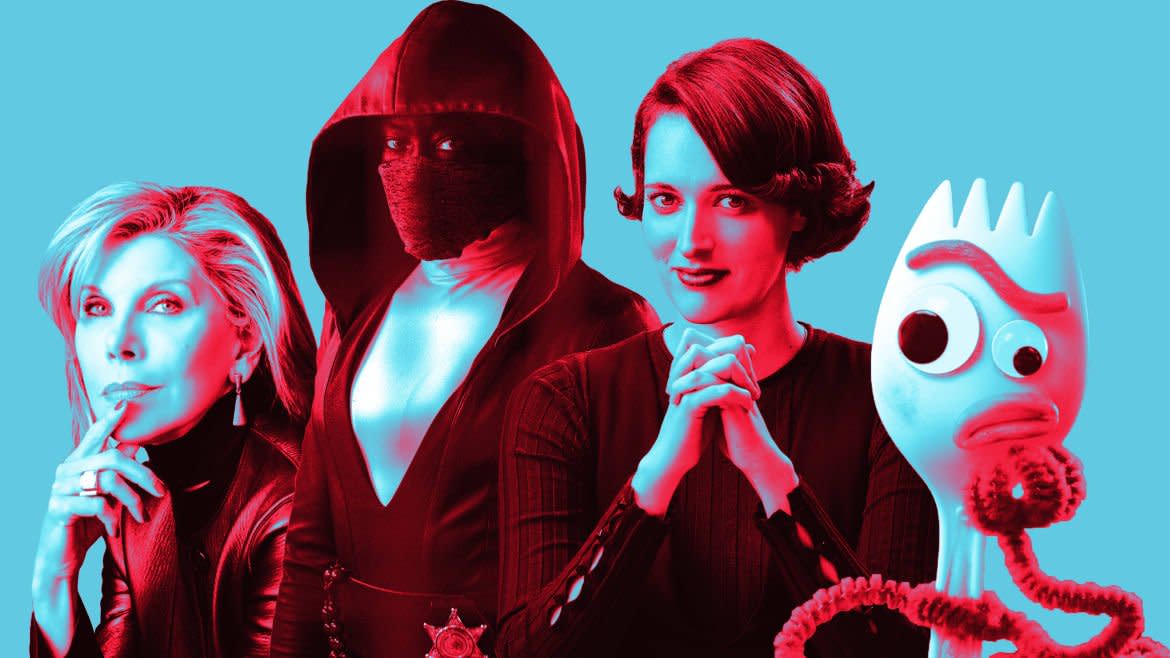
There were times in 2019 when television didn’t seem like a pleasure as much as it did a full-on assault.
The hashtag #TooMuchTV was slapped on the still-hard-to-believe statistic that well over 500 scripted series alone aired this year, a fact so overwhelming that many TV fans ducked for cover by retreating back to old favorites. To wit, some of the biggest TV hits of the year were the old sitcoms—Friends, The Office, Seinfeld, The Big Bang Theory—that were scooped up by streaming services for astronomical fees.
Yet even with palpable skepticism as to whether the boom of streaming services is necessary or tenable, it was an unprecedented time for great television. The original running list of shows to consider for a “Best of the Year” list stopped just short of 100 at 96 series. My draft of a Top 20 changed more than a dozen times, and likely would be different if I were finalizing it tomorrow rather than today.
It’s striking, though maybe unsurprising, that near the top of the list it became almost impossible to extricate what I considered the best shows of the year from the turbulence of the time we’re watching them in—specifically what they contribute to the discourse of the era and how they help us navigate our own feelings about it.
In that respect, I found myself appreciating a short-form children’s series featuring Forky from Toy Story more than that aggravating final season of Game of Thrones…
20. Forky Asks a Question (Disney+) and Couples Therapy (Showtime)
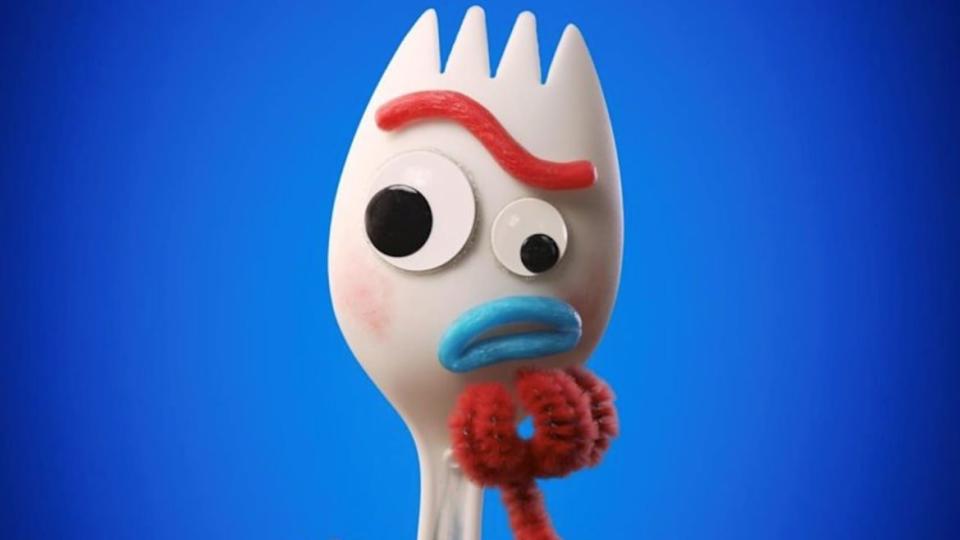
It’s both a cheat and cheeky to have a tie, and for that tie to be these two programs. But these shows have more in common than you’d think! (Bear with me.) Forky Asks a Question is a children’s show based on the popular Toy Story 4 character. Forky is grappling with his sentience, in a canny move, alongside the kids the show is targeted at. Episodes ask “What is love?” “What is money?” and “What is a friend?”—existential queries delivered in touching fashion with some of the funniest dialogue and slapstick humor on TV.
It’s a show about the profundity of innocence, in contrast to Couples Therapy, a visceral representation of the frank reality that as we age, our innocence is lost. If Forky is about seeking connection, Couples Therapy reveals the perils of finding it. An intimate, voyeuristic documentation of several New York City couples trying to save their relationships with counseling, the series is a titillating breach of sanctified personal and emotional spaces and, consequently, a riveting agitation of the raw nerves that make all of us tick.
19. Orange Is the New Black (Netflix)
In some respects, this is a career honorarium for the series that, maybe more than any others, redefined television this past decade. Coming soon after Netflix launched House of Cards, it was an even riskier gamble: a series meant to be binged, no major stars, the most diverse ensemble TV had ever seen, tonally audacious in its veering from raucous comedy to stark drama, and with a sociopolitical agenda, specifically when it comes to the underrepresented voices of women, people of color, immigrants, and the incarcerated in America.
But the final season of Netflix’s longest-running original series merits mention on this list in its own right. In typical Orange Is the New Black fashion, the litany of storylines could hit or miss, but were explosively powerful when they connected. Few shows in 2019 went after the inexcusable injustices of ICE and immigrant detention centers as successfully. The brutal realities of racial privilege in America are rarely discussed with such frankness. Anchoring it all were towering, heartbreaking performances from Danielle Brooks, especially, as well as cast members Laura Gómez, Taylor Schilling, Diane Guerrero, and Natasha Lyonne.
Kirsten Dunst on Becoming a Scamming, Cult-Leading Beauty Queen: ‘I Respond to These Things’
18. On Becoming a God in Central Florida (Showtime)
There are few things more pleasurable than a perfectly suited Kirsten Dunst star vehicle. She is a more interesting actress than, for much of her career, she got credit for, with a peculiar taste in projects. Take On Becoming a God in Central Florida, a series about a broke, widowed mother in the depressing shadows of Orlando in the ’90s who is saddled with her husband’s debt from a pyramid scheme.
The more she tries to extricate herself from the organization, the deeper into it she gets, exposing a disturbing cult to which it’s not hard to draw parallels to Scientology. It’s a deeply weird, deeply addicting show, anchored by a dynamo performance from Dunst—the kind of series this influx of television content is supposed to surface, but so rarely does.
17. Documentary Now! (IFC)
What tickles me about Documentary Now! is that it shouldn’t really appeal to anyone. Each episode is a meticulous, specific homage to a niche cult documentary. You can’t even really call them satires. They’re celebratory recreations that nail the tone and whatever the “thing” is about each one that inspired such passionate fan bases, managing to be funny while saying something about art and humanity at the same time.
The series, from Seth Meyers, Bill Hader, Fred Armisen, and Rhys Thomas, is three seasons in at this point, but some of its best, most ridiculously entertaining episodes yet came this year, especially “Original Cast Album: Co-Op,” inspired by the notorious 1970 documentary featuring the original cast of Company, and Cate Blanchett in one of the TV performances of the year as a Marina Abramovic-type artist in “Waiting cor the Artist.”
16. Back to Life (Showtime)
There was a lot of noise being made on TV this year, with massive series saying farewell and buzzworthy breakout hits whirling new hurricanes of fandom and debate. So there’s a certain kind of pleasure, and almost singular achievement, in a show like Back to Life, a quiet, confidently devastating series that aired in Fleabag’s former U.K. time slot before coming to the U.S. on Showtime.
Created by, written by, and starring Daisy Haggard, the series centers on a woman returning to her small hometown after serving 18 years in prison for a violent crime. Questions about how we vilify women who have done something bad versus how we would treat a man, and who merits forgiveness, are considered, but all with a biting humor that keeps the show from being pedantic or moralizing—instead just deeply fascinating.
15. Russian Doll (Netflix)
Russian Doll is a series in which the same day is lived over and over again, Groundhog Day-style. Yet with each successive episode—sometimes even new scene—new layers are slyly unveiled: sometimes funny, sometimes incredibly sad, often trippy, and almost unsettlingly surprising.
Co-creators Natasha Lyonne, Leslye Headland, and Amy Poehler did the thing all creators should venture to do: Make something that no one else besides them could make, let alone make this well. And what they made was an energizing, engrossing series that doubled as an unexpected look into the cyclical nature of addiction, depression, existential crises, and emotional breakdowns. Season Two is coming, and I can’t wait to do it all again.
14. Schitt’s Creek (Pop TV)
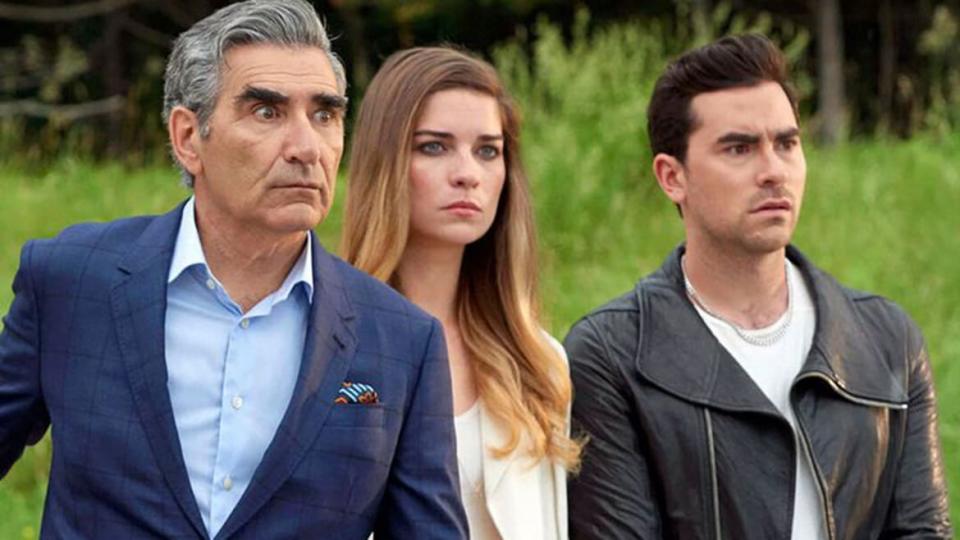
It’s almost revolutionary, based on recent trends in TV comedy, where darkness and cynicism seem like more of a directive than humor and laughs, to create a series after which the audience just feels... nice. That they’ve had a happy experience. That’s purposeful on Schitt’s Creek, which father-son creators Daniel and Eugene Levy developed as a place where bigotry and even cruelty do not exist.
The trick is that their world doesn’t even really seem utopian, but shockingly close to an existence we could actually enjoy if we only bothered to try. Some of the most quotable dialogue on TV; big, swoon-inducing feelings; and ace comedic turns from Catherine O’Hara, Annie Murphy, and the Levy duo prove that earnestness can still produce excellence.
13. Veep (HBO)
Julia Louis-Dreyfus’ performance in any season of Veep alone could get the series a mention on any year’s Best TV list. But the stakes were high for the final season of the HBO comedy, which never should have worked as well as it did during the Trump administration, and certainly shouldn’t have been able to stick the landing after such audacious comedic acrobatics in its final season. In response to the lunacy in the actual White House, which has made any sort of political satire soberingly difficult, and even unfunny, Veep responded by pivoting from playful to exceedingly dark.
As viciously profane as ever, the final episodes doubled down on the moral bankruptcy of its characters. It’s a confrontational reflection of ourselves we see in the show’s funhouse mirror: the disconnect between policy and people, and the disregard for life, liberty, and the pursuit of happiness when all that matters is the pursuit of power. The system is broken, and the fate of our country is in the hands of the lunatics depraved enough to wade through the shards of glass.
12. Better Things (FX)
The third season of Better Things was a test case necessitated by grotesque, unfair circumstances. The show’s existence and, arguably, much of its original creative voice was owed to Louis C.K., who personally recommended his longtime creative partner Pamela Adlon for her own show at FX and had executive producer and co-writing credits on nearly every episode. When the network cut ties with him after he admitted to exposing himself and masturbating in front of women without their consent, critics wondered what it would mean for Adlon’s sensational series.
It’s always been a product of her voice and taste, down to the fact that she wears her own clothes as her character, Sam, and the spectacular, Louis C.K.-less third season proved just how assured that voice is. There’s nothing particularly linear about the narrative in Better Things, which has been described in the past as a “tone poem” of a TV series. We get little snapshots of moments in Sam’s life, yet each glimpse is so fully realized and emotionally rich that you see whole story lines immediately—whole lifetimes, really.
11. The Good Fight (CBS All-Access)
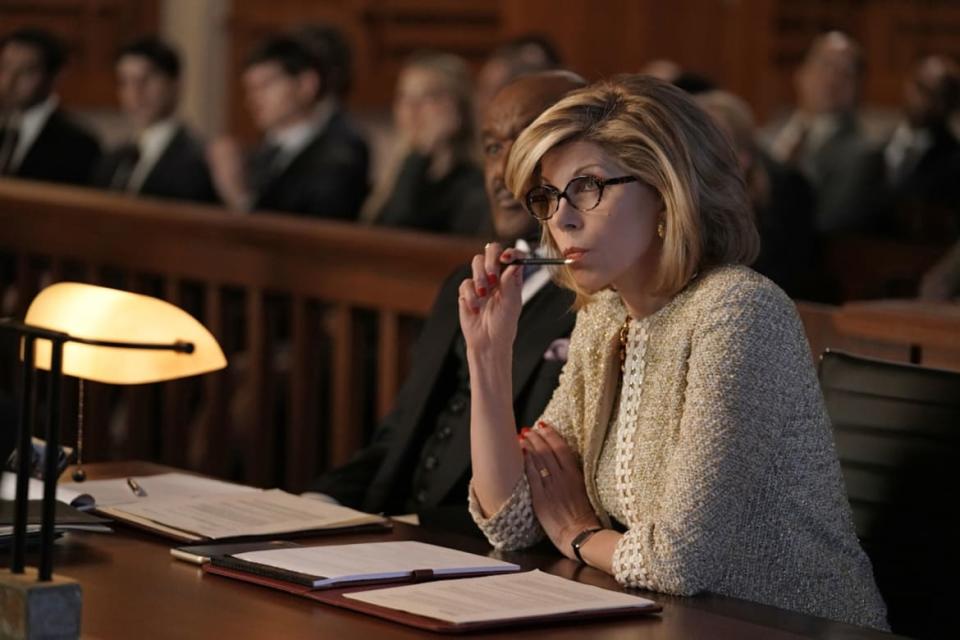
When it premiered in February 2017, The Good Fight was the first scripted TV series to acknowledge not only the existence of Donald Trump in its fictional universe, but the effect his winning the presidency had on the psyches of nervous Americans, politically engaged liberals, especially. The CBS All-Access drama’s third season proved that no other series could eviscerate Trump better. But it also reassured that the show had a steady hand on the ways in which our feelings about living through a Trump presidency has evolved—or, maybe more accurately, devolved.
It gets how we weather news cycles in alternating states of delirium and anger. Shrewdly, the season integrated a bit of both-sides critique, sending up the hypocrisy and inefficacy of liberal resistance extremists. With standout performances from Christine Baranski, Audra MacDonald, and Delroy Lindo, the show embraces the surreality we all feel with outrageous hallucinatory sequences—it’s maybe the only show in 2019 in which a character performed a monologue about toxic masculinity to a bruise that morphs into the face of Trump—but never loses its grip on the gravity of what is happening and how it makes us feel.
10. The Other Two (Comedy Central)
The story is that former Saturday Night Live head writers Chris Kelly and Sarah Schneider were inspired to create The Other Two after Justin Bieber hosted the show and missed rehearsals because the raw-egg diet managers put him on made him sick. Their Comedy Central series is elevated from that anecdote: A brother and sister on the older side of the millennial spectrum are both struggling for career success in New York when their much younger brother, Chase, becomes a YouTube celebrity. Suddenly, they must grapple with being overshadowed by their 13-year-old brother.
It’s impeccable showbiz satire coming at a transitional time in the industry that is deceptively hard to send up. But it’s also a heartfelt examination of two bumbling adults leaning on each other as their grace period for “figuring things out” reaches an expiration date. The writing is deliciously salty, the relationships endearing sweet—“Chase Gets the Gays” may be the best “Very Special Gay Episode” of a sitcom I’ve ever seen—and the performances from Drew Tarver, Heléne Yorke, and especially Molly Shannon as their mother, are spectacular.
9. Barry (HBO)
There was so much about the initial premise of Barry that seemed too high-concept to ever be taken seriously. An experienced hitman wants to leave the biz to pursue acting, despite having no experience or discernible talent. Episodes would straddle both worlds, the violent nature of hit jobs and the goofiness of a low-rent Los Angeles acting school headed by Henry Winkler. More, it would be Saturday Night Live alum Bill Hader taking on this dark, tortured lead role.
Its extraordinary first season threaded all those elements together with a shrewd handle on how moral ambiguity and frustration guided Hader’s Barry. Season Two deepened the story, focusing on Barry’s struggle to escape his past, all the while lending more nuance to each of the compelling supporting characters’ own existential journeys. This all happened while the series continued its track record of being one of the most visually arresting and aesthetically daring half-hour series on TV, best exemplified by the wild, buzzy outing “ronny/lily.”
Bill Hader’s ‘SNL’ Anxiety Inspired His Violent New Role as an Assassin
‘Leaving Neverland’ and the Twisted Cult of Michael Jackson Truthers
8. Leaving Neverland (HBO)
The two-part documentary series Leaving Neverland, chronicling the allegations of two men who say Michael Jackson raped them while they were children, arrived like a seismic event. It is not the first time allegations like these were made against Jackson. But there was something about the disturbing specificity with which accusers Wade Robson and James Safechuck describe what they claim Jackson did to them and the space with which director Dan Reed gave them to explain how the trauma has lingered and affected every aspect of their lives since. It was the most damning indictment of Jackson yet.
There is obvious impact in the shocking, grotesque nature of the sex acts that Robson and Safechuck describe, which allegedly began when Robson was 7 and Safechuck was 9. But also unsettling were their accounts of how Jackson brainwashed them into keeping the secret and covering up his tracks, and how the singer’s celebrity and the global adoration of him contributed to their families trust in him and his ability to outlast decades of pedophilia rumors.
It’s a documentary that doubles as a cultural reckoning: Fans, from the militant “truthers” who maintain Jackson’s innocence to those who simply like his music, are forced to wrestle with the greatest entertainer of all time’s legacy—and whether they can ever listen to his music again.
7. Unbelievable (Netflix)
Unbelievable is a timely, at times thrilling, and most of all rage-inducing telling of negligence, institutional misogyny, and injustice, mirroring its incredible source material: the Pulitzer Prize-winning investigation “An Unbelievable Story of Rape.”
An 18-year-old girl reports a rape to the police, but during insensitive interrogations by male detectives is coerced into recanting her story, leading to her public flogging as the girl who cried wolf. It’s only after the unlikely collaboration of two female detectives in a different state and their dogged investigation into a serial rapist that they not only catch the perpetrator, but vindicate the original young girl.
Featuring focused, fantastic acting work from Kaitlyn Dever, as well as Toni Collette and Merritt Wever as the detectives, the Netflix limited series resists temptations to sensationalize or exploit in the name of more cinematic drama. Instead, its brisk, no-frills style contributes a fittingly journalistic approach to telling the story, using the audience’s own burning desire for justice as the spark for the fireworks the investigation deserves.
6. When They See Us (Netflix)
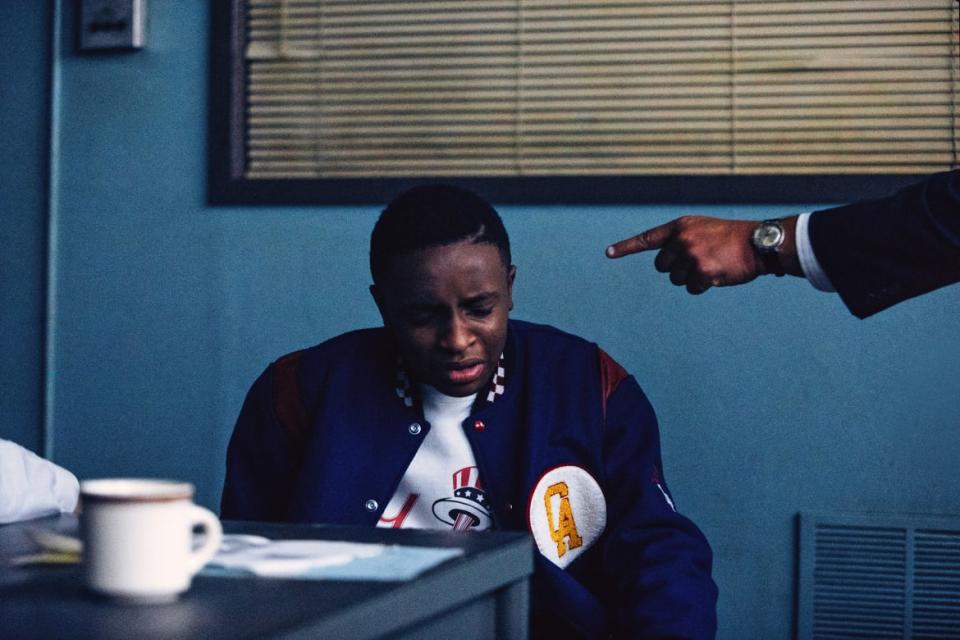
You can credit the brilliant Ava DuVernay’s epic approach to telling the story of the men who are now the Exonerated Five for stoking feelings of shame and inspiration at the same time. Her brilliant flourishes never distract from or disguise the brutal integrity of the story being told: of five young boys from Harlem, all boys of color, who were falsely convicted of rape in 1989 and spent years in prison for a crime they didn’t commit because of the failure of racist institutions, media, and the justice system to protect them.
After spending nearly half their lifetimes in jail under the collective branding of the Central Park Five, Korey Wise, Antron McCray, Yusef Salaam, Kevin Richardson, and Raymond Santana’s stories are now given the dignity of context, emotion, and truth. DuVernay ensures that their stories are bathed in the beauty that they deserve and, more, that they land with the kind of shattering impact they were owed 30 years ago.
5. PEN15 (Hulu)
At face value, it’s a cute gimmick. Collaborators Maya Erskine and Anna Konkle revisit the awkward, thrilling trauma of weathering their seventh-grade year and the stresses it puts on girls’ friendship, but do so by actually inserting themselves back into the scenarios they suffered through as pubescent tweens in the year 2000. They are women in their early thirties portraying 12-year-olds and acting alongside an entire cast of actual, age-appropriate children. The gimmick definitely lands. That it ends up being so much more is the big surprise.
You reflexively cringe and your heart shatters into a million pieces at any given moment. It’s the emotional specificity with which they recreate the toxic incubator of insecurities and cruelty that is a middle-school hallway; its way in which it validates the massive, almost unmanageable feelings of that time. It’s the way in which everyone, young girls especially, feel finally seen. PEN15 is both a hilarious comedy and a horror show, bridging the genres with a simultaneously uncomfortable and cathartic reflection of the human spirit at its most brittle stage of development.
4. Years and Years (HBO)
When it feels like the world is burning, it’s not the greatest comfort to turn on a series that reveals that it’s unlikely that the fire will be extinguished and, in fact, might even become an inferno the likes of which we wouldn’t dare even imagine. That’s the experience of watching Years and Years, the limited series from Russell T. Davies that begins with a close-knit British family attempting to reconcile the deplorable state of the world. It then hurtles into the near future of 2024, where we see the international implications of the xenophobic, economically disastrous, environment-decimating policies enacted by world leaders, especially Trump.
It’s a nihilistic depiction of the future, particularly in its seeming inevitability. There’s an episode centered on the lengths that a same-sex couple, one of whom is a Ukrainian refugee, must go through to be together that may rank as the most viscerally upsetting piece of television I have watched in my career. There are moments from the show that burrow into your consciousness, stalking you and plaguing you with anxiety and sullenness—much like the experience of watching the news.
Years and Years, then, is both a cautionary tale and a harsh mirror, tapping into recognizable, inescapable feelings of today: the paranoia, the frustration, the anger, and, maybe most of all, the notion of being trapped.
3. Succession (HBO)
It shouldn’t be so satisfying to watch smug rich assholes behaving so deplorably. It should be the antithesis of anything we would enjoy in 2019, when it’s impossible to escape the tyranny of those people in our everyday lives. Yet there’s a Shakespearean elegance to Succession and the swagger with which it navigated its adrenaline-packed second season that doesn’t just explode the idea that we shouldn’t be enjoying it, but makes a case for its cultural necessity.
It juggles themes that are constantly on our minds, frustrating and depressing us on an eternal loop: wealth and privilege, power and corruption, political cronyism, culpability, misogyny, the media and spin, capitalism and commodity, sex, entitlement, and dynastic chokeholds. The show then lavishes these things with dialogue so winking and perverse it borders on trolling, and a kind of production value that can only be described as sumptuous. These embellishments all counterbalance its insistence on playing its characters straight, without judgment. And how about that season finale?
2. Watchmen (HBO)
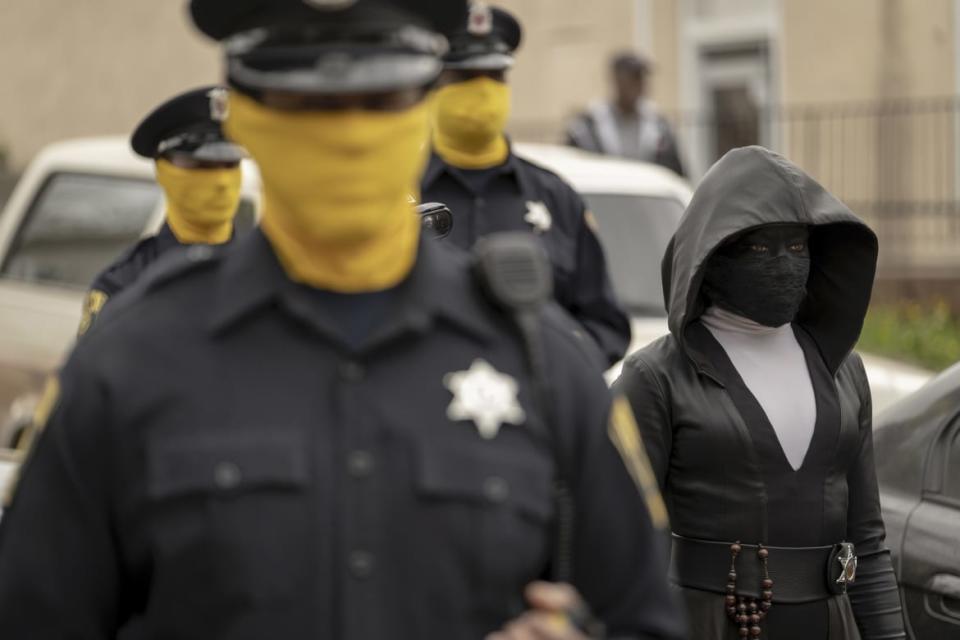
When all is said and done, the first season of Watchmen could go down not just as one of the decade’s best, but maybe even one of the all-time greats. There’s a bit of recency bias there, of course. The season finale aired just days before this Best TV list published. But even applying the skepticism of objectivity, it’s hard not to fawn over a series that met this much storytelling and visual ambition with this much assured confidence in its execution.
It’s daring on its own to approach the hallowed Watchmen universe for a series that brings its characters and mythologies to modern day. And who knows where Damon Lindelof developed not just the insight, but the cajones, to use the graphic novel’s story Bible as a launching pad for interrogating issues of race and policing in America today. Threading the two asked for faith from viewers, but taking the leap wasn’t hard when there were was such mesmerizing style in how it was all put together.
Any list of the year’s best episodes would be top-heavy with Watchmen outings: “The Extraordinary Being,” “A God Walks Into Abar,” “Little Fear of Lightning,” or “She Was Killed by Space Junk.” But taken as a whole, the season is a singular, spectacular achievement.
1. Fleabag (Amazon)
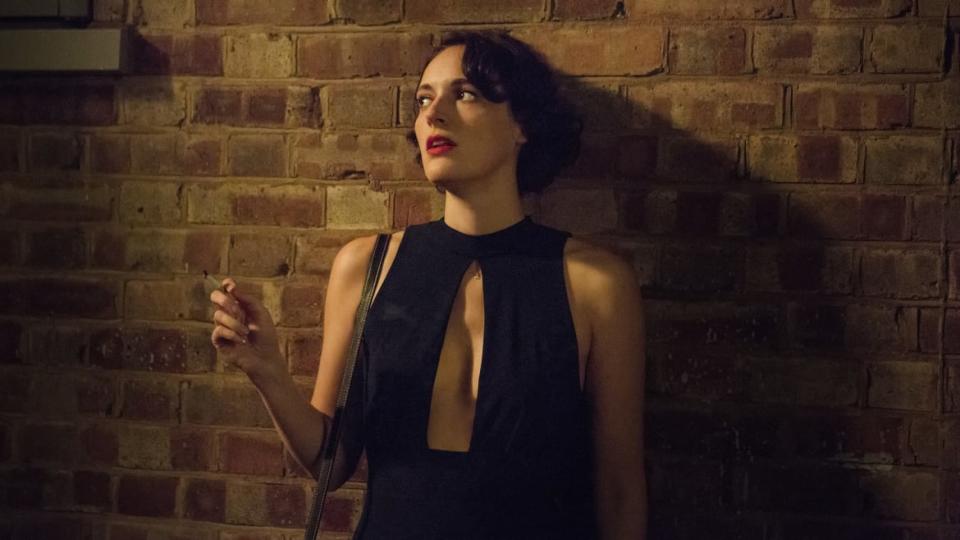
Of course Fleabag is at the top of this list. Ignoring the fact that it is, minute-by-minute and frame-by-frame, an example of creative near-perfection, the way in which the second season of a small, auteur British comedy managed to explode into the zeitgeist at the prodigious scale Phoebe Waller-Bridge and the series did in this past year is an achievement unlikely to be replicated again in this age of #TooMuchTV.
The wit with which Waller-Bridge manages to explore a person’s humanity, in this case her semi-aimless title character, and use that to amplify bubbling feelings society is grappling with, marks the kind of once-in-a-generation voice we clamor for but don’t even know we’ve discovered until the truths they are speaking confront us head-on. Fleabag explores feelings both basic (What makes a person happy?) and complex (When are they allowed to pursue it?), attempting hope even when arriving at wrenching heartbreak (What if we know what we want, but aren’t allowed to have it?).
Dismiss all the heady praise for What the Show Means or What It Says About Us, and you still have the best one-act play of the year in the second season premiere’s dinner party, the best sibling relationship on TV between Waller-Bridge and co-star Sian Clifford, impeccable directing, and the kind of phenomenal acting performance that births a phenomenon, courtesy of Andrew Scott’s “Hot Priest.” Where would we have been in 2019 without the Hot Priest?
Got a tip? Send it to The Daily Beast here
Get our top stories in your inbox every day. Sign up now!
Daily Beast Membership: Beast Inside goes deeper on the stories that matter to you. Learn more.

